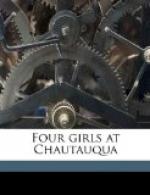repeated in Marion’s hearing. What of all
that? Why, that little gloomy kitchen was Marion’s
memory of home; that old, tired man was her father,
and he used to sing those words while his hand wandered
tenderly through the curls of her brown head, and
patted softly the white forehead over which they fell;
and all of love that there was in life, all that the
word “tenderness” meant, all that was dear,
or sweet or to be reverenced, was embodied in that
one memory to Marion. Now you understand the
flashing eyes. She did not believe it at all;
she believed, or thought she did, that the “broad”
and “narrow” roads were all nonsense;
that go where you would, or do what you would, all
the roads led to
death; and that was the end.
But the father who had quavered through those lines
so many times had staked his hopes forever on that
belief, and the assurance of it had clothed his face
in a grand smile as he lay dying—a smile
that she liked to think of, that she did not like
to hear ridiculed, and to her excited imagination Dr.
Eggleston seemed to be ridiculing the faith on which
the hymn was built. “They are more thorough
hypocrites than I supposed,” she said, in scorn,
and hardly in undertone, in answer to Eurie’s
inquiring look. “I don’t believe
the stuff myself, but I always supposed the ministers
did. I gave some of them at least credit for
sincerity, but it seems it is nothing but a fable
to be laughed to scorn.”
“Why, Marion!” Eurie said, and her look
expressed surprise and dismay. “He is not
making fun of religion, you know; he is simply referring
to the inappropriateness of such hymns for children.”
“What is so glaringly inappropriate about it
if they really believe the Bible? I’m sure
it says there that there are two roads, one broad and
the other narrow; and that many people are on one and
but few on the other. Why shouldn’t it
be put into a hymn if it is desirable to impress it?”
“I’m sure I don’t know,” Eurie
said, unaccustomed to being put through a course of
logic. “Only, you know, I suppose he simply
means that it is beyond their comprehensions.”
“They must have remarkably limited comprehensions
then if they are incapable of understanding so simple
a figure of speech, as that there are two ways to
go, and one is harder and safer than the other.
I understood it when it was sung to me—and
I was a very little child—and believed
it, too, until I saw the lives of people contradict
it; but if I believed, it still I would not make public
sport of it.”
At this point Ruth leaned forward from the seat behind
and whispered:
“Girls, do keep still; you are drawing the attention
of all the people around you and disturbing everybody.”




